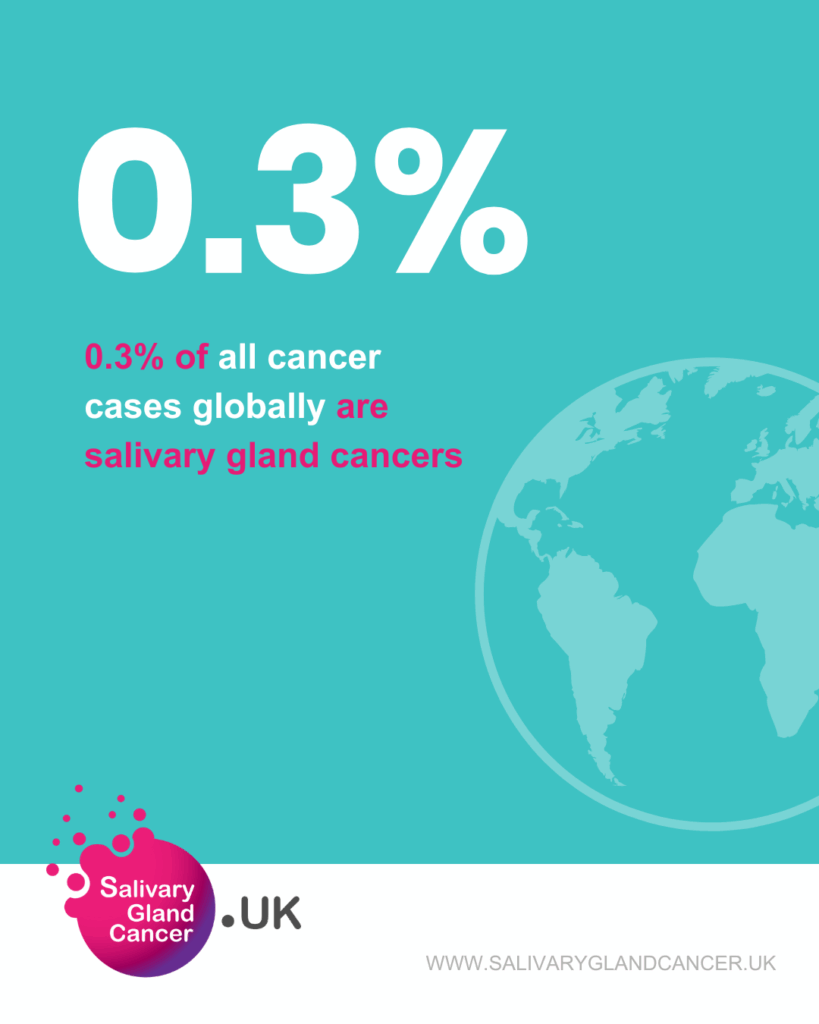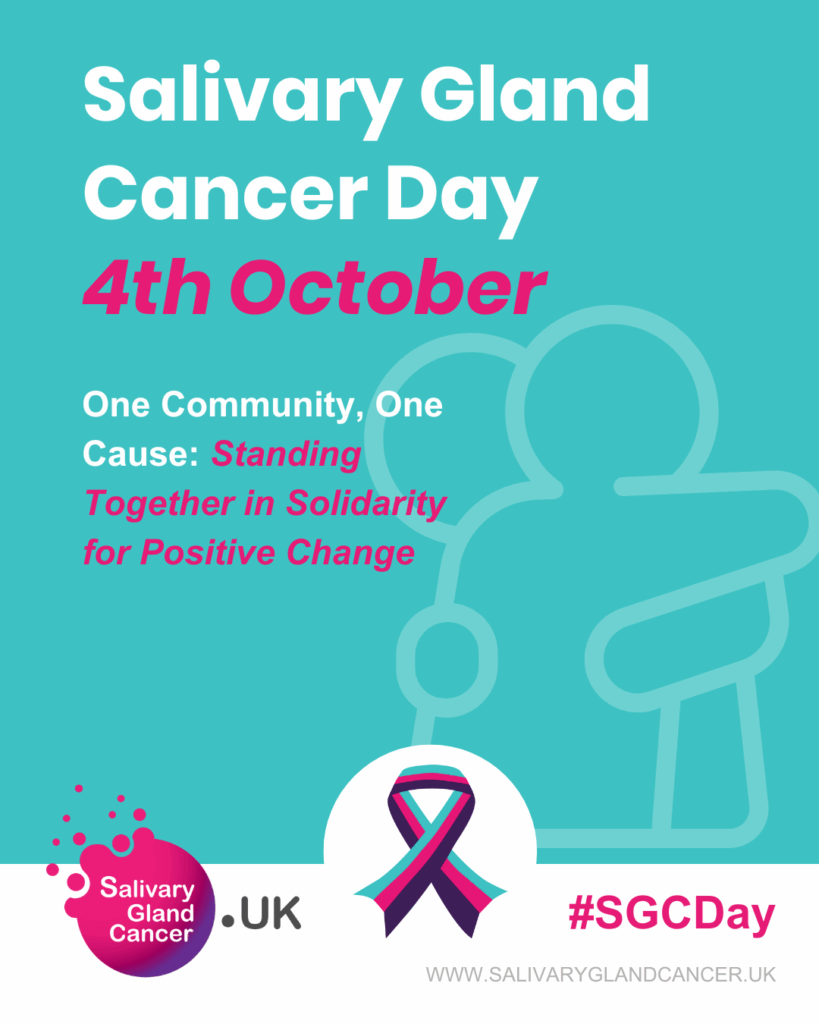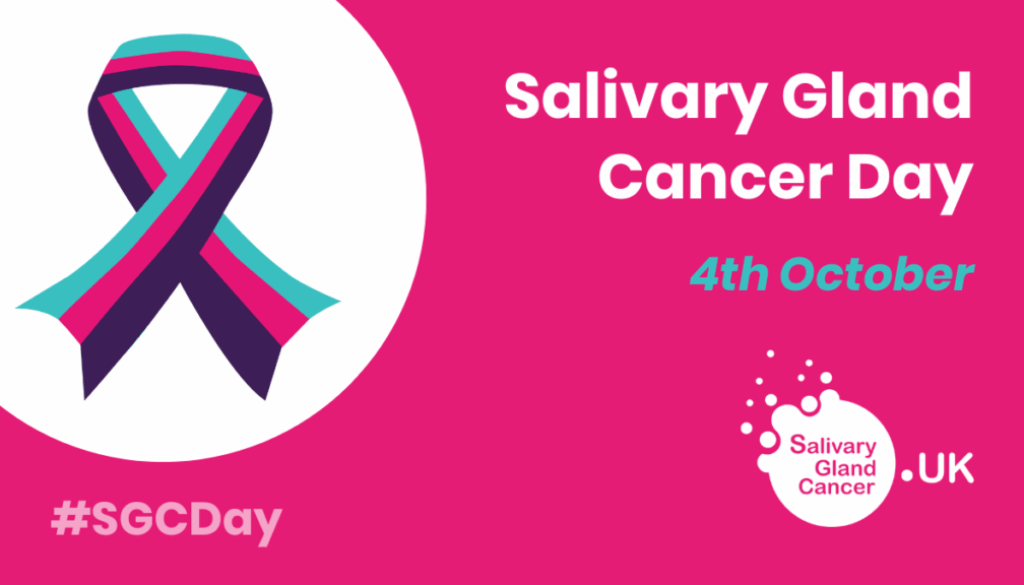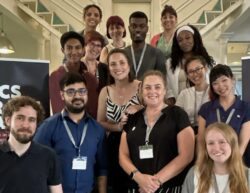Salivary Gland Cancer Day: One Community, One Cause. Standing together in Solidarity for Positive Change.
What is Salivary Gland Cancer?

Salivary gland cancers are rare with only 0.3% of cancers globally being salivary gland cancers. They can affect the salivary glands (in the mouth) and also secretory glands in other parts of the body (trachea, breast, vulva, skin, lacrimal gland). There are more than 20 different types and there is a lack of approved drug therapies. Diagnosis is often late and prognoses are poor. Early detection and awareness can make a difference, yet many people are unaware of the signs, which are often mistaken for something less serious — sometimes there are no signs at all. To learn more about the different types of Salivary Gland Cancers visit Salivary Gland Cancers.
Raising awareness about salivary gland cancer can lead to earlier diagnosis, better outcomes, and improved understanding.
Raising awareness through Salivary Gland Cancer Day 2025

By coming together as one community, we can ensure more people are informed, empowered, and supported. It can be a very lonely experience to be diagnosed with a salivary gland cancer and we want to do everything we can to help patients feel less alone. Which is the driving force for the 2025 launch of the world’s first Salivary Gland Cancer Day, the theme is rooted in unity — “One Community, One Cause: Standing Together in Solidarity for Positive Change.”
This powerful message speaks to the heart of what this day represents: a shared journey, a collective voice, and a united stand. It’s a reminder that no one faces this alone — together, we are stronger, and together, we can create lasting, meaningful change. Whether you’re a patient, a family member, a friend, a healthcare professional, or a supporter, we’re all part of one community, standing together to create positive change. Salivary Gland Cancer Day is all about building connections, sharing knowledge, and supporting each other to make a real difference.
Jade’s story
Jade shares her experience of being diagnosed with acinic cell carcinoma of the parotid gland, at just 27 years old and seven months pregnant with her second child. Her cancer was found by chance after she fainted due to severe migraines — which turned out to be pregnancy related — and was sent for an MRI. The scan led to a diagnosis of acinic cell carcinoma, despite not being able to feel a lump or having any other symptoms, though she wasn’t informed of her diagnosis until 5 days after giving birth. Fortunately, it was caught at an early stage, and she underwent surgery shortly after her son was born. Jade shares her story to help others—especially young people—feel less alone with a rare diagnosis, and encourages everyone to trust their instincts and seek help when something doesn’t feel right.
Cancer isn’t just for the older generation — it can happen to anyone, at any time, and sometimes without any warning. I share my story so that other young people know they’re not alone, and so they take their health seriously, no matter their age.
Shane’s story
Shane from Leeds shares his experience of being diagnosed with Adenoid Cystic Carcinoma of the Lacrimal Gland, a rare form of salivary gland cancer. What began as persistent headaches initially being treated as migraines turned into a diagnosis following a scan and surgical biopsy of the tumour. “I was lucky to be diagnosed correctly the first time, which is often not the case for a lot of people with ACC who are misdiagnosed, which causes a lot of different issues.“ Following diagnosis Shane underwent surgery to remove his eye followed by radiotherapy. Shane speaks honestly about the worry and uncertainty he faced early on, and how over time, he learned to take things one step at a time. He also reflects on how much support—from family, friends, and Salivary Gland Cancer UK—helped him through. Post-treatment, Shane is focused on living in the moment and reassuring anybody who may be facing vision loss as part of their treatment.
It’s by no way, shape or form as bad as you’d think it would be and even when things feel overwhelming, “the sun will always shine tomorrow.”
How can you help?
Join the movement and show your unity by posting online and raising awareness of Salivary Gland Cancer day on Saturday 4th October 2025.
Visit Salivary Gland Cancer Day 2025 web page for more information about Salivary Gland cancer day and to access shareable resources.
Share, like and post and don’t forget to include Salivary Gland Cancer day 2025 Hashtags: #SGCDay and #SalivaryGlandCancerDay.
To find out more information or for further support visit https://www.salivaryglandcancer.uk/




